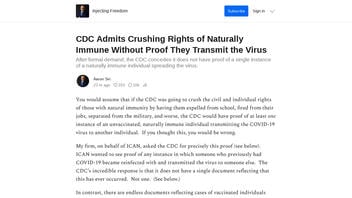
Did the Centers for Disease Control and Prevention "admit" it has no proof that a re-infected naturally immune individual can spread the virus that causes COVID-19? No, that's not true: This is a recycled gambit by anti-vaccine and COVID-denial activists. The group or individual submits formal document requests to government agencies and, if the request for specific documents is turned down, the group cites its failed records request as proof of a broad proposition. In this iteration of the records gambit, the claim is based on a letter to the CDC requesting documentation of any case of an unvaccinated person who contracted COVID, recovered, was infected a second time and then transmitted the virus to another person. The CDC did not say there is no such case. In its reply, the national public health agency said it does not collect data that covers the request.
The claim appeared in the Injecting Freedom newsletter's November 11, 2021, article titled "CDC Admits Crushing Rights of Naturally Immune Without Proof They Transmit the Virus " which opened:
After formal demand, the CDC concedes it does not have proof of a single instance of a naturally immune individual spreading the virus.
Users on social media only saw this title, description and thumbnail:
CDC Admits Crushing Rights of Naturally Immune Without Proof They Transmit the Virus
After formal demand, the CDC concedes it does not have proof of a single instance of a naturally immune individual spreading the virus.
The writer of the newsletter article said the proof is important, when natural immunity is not being accepted as equivalent to vaccination:
You would assume that if the CDC was going to crush the civil and individual rights of those with natural immunity by having them expelled from school, fired from their jobs, separated from the military, and worse, the CDC would have proof of at least one instance of an unvaccinated, naturally immune individual transmitting the COVID-19 virus to another individual. If you thought this, you would be wrong.
Submitted by a "Gabrielle G. Palmer, Esq.", the September 2, 2021, request on behalf of the Informed Consent Action Network was for:
Documents reflecting any documented case of an individual who: (1) never received a COVID-19 vaccine; (2) was infected with COVID-19 once, recovered, and then later became infected again; and (3) transmitted SARS-CoV-2 to another person when reinfected.
The CDC's November 5, 2021, response includes this summary of its findings:
A search of our records failed to reveal any documents pertaining to your request. The CDC Emergency Operations Center (EOC) conveyed that this information is not collected.
Lead Stories has asked the CDC press office to explain why CDC data doesn't permit drilling down to find individual cases that cover all five factors:
- Unvaccinated
- Contracted COVID
- Recovered
- Reinfected
- Transmitted COVID to another
We will update this fact check when the CDC replies.
The CDC website makes it clear that CDC data is only as good as what is forwarded to it by state public health agencies and many agencies are overwhelmed by the pandemic. Contact tracing, the collection of data on individual Americans' social circles, cross-tabbed by reported infections, has been resisted in many areas of the United States, making that data unreliable.
The CDC's published position is that there is no approved test to reliably establish if a previously-infected person's immunity is sufficient to reduce their risk of contracting or spreading the virus. With no such test, mere documentation of having been infected doesn't match a vaccine card. Further, the CDC's website says, the body of evidence in support of natural immunity is not sufficient for a finding that post-infection immunity is predictably equal to post-vaccination immunity.
New research at UCLA partially supports the CDC's position: it indicates the strength of natural immunity depends on the severity of the case of COVID that a person survived in order to develop antibodies to fight the SARS-CoV-2 virus. Virologist Dr. Otto Yang documented the wide variability in the effectiveness of natural (post-infection) immunity in his most recent study: "Primary, Recall, and Decay Kinetics of SARS-CoV‐2 Vaccine Antibody Responses".

















